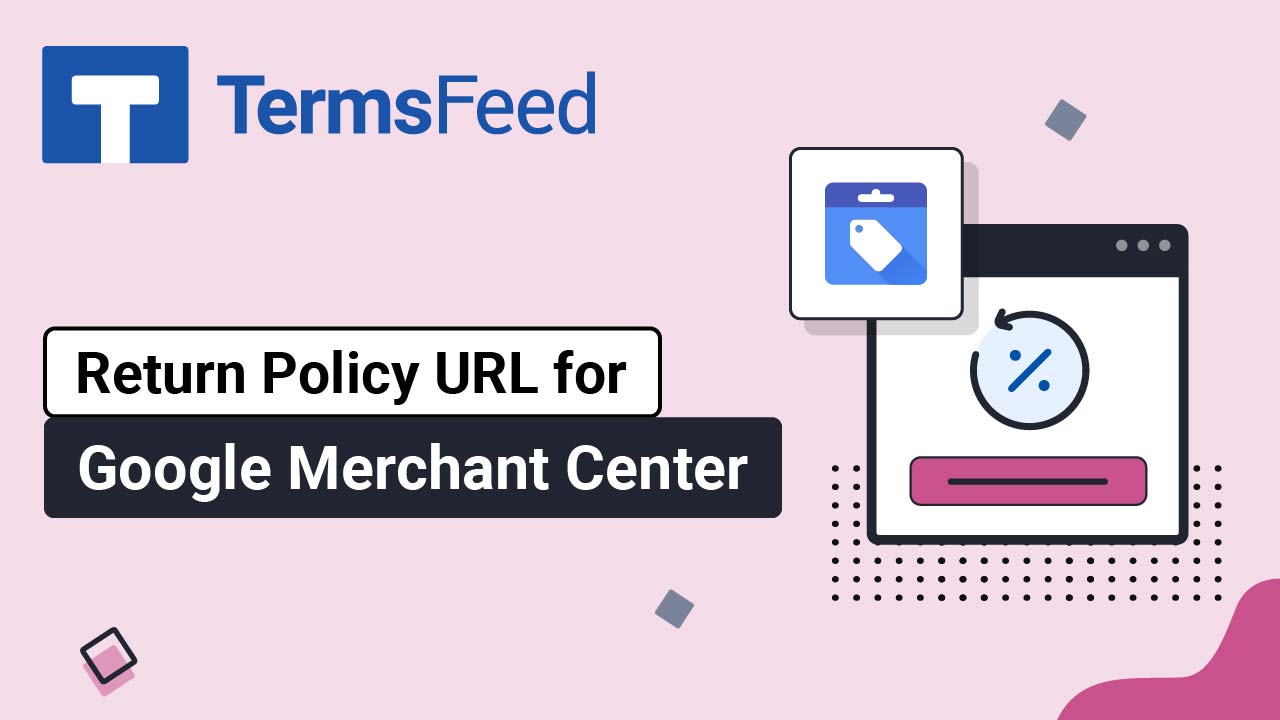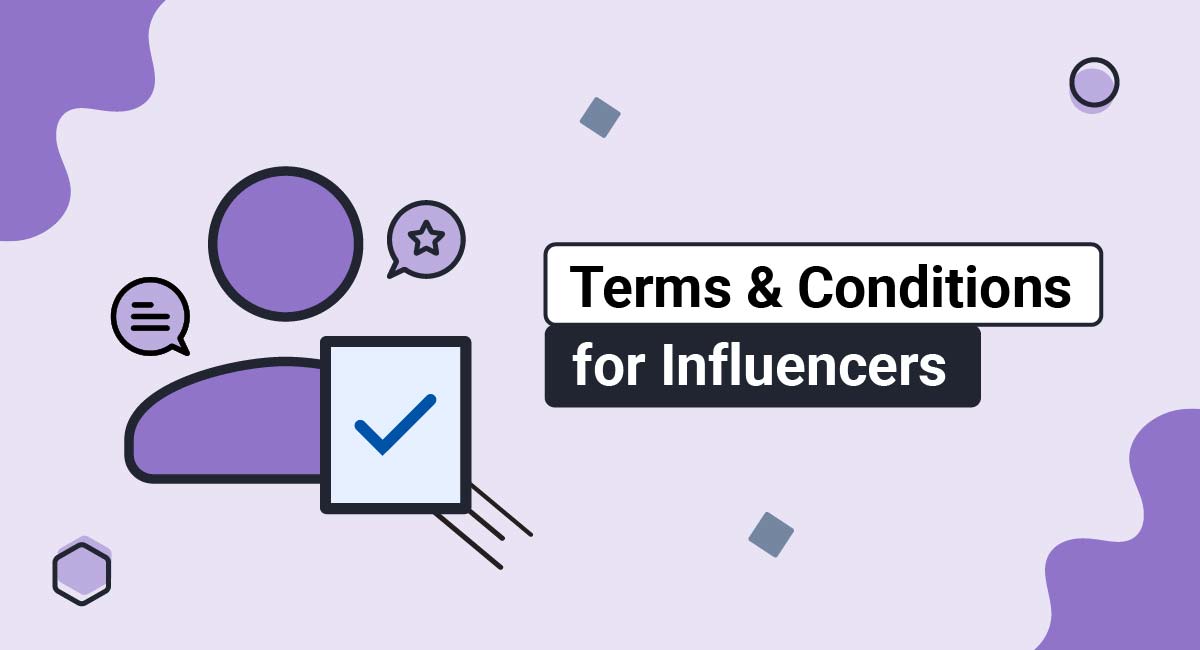Return and Refund Policy for Google Merchant Center
google-merchant-center-return-refund-policy
Use our Cookie Consent all-in-one solution (Privacy Consent) for cookies management to comply with GDPR & CCPA and other privacy laws.
- For GDPR, CCPA and other privacy laws
- Apply privacy requirements based on user location
- Get consent prior to third-party scripts loading
- Works for desktop, tables and mobile devices
- Customize the appearance to match your brand style
Create your Cookie Consent banner today to comply with GDPR, CCPA and other privacy laws:
- Start the Privacy Consent wizard to create the Cookie Consent by adding your website information and click "Next step":
- At Step 2, add some information about your business type, select the country where you operate from and click "Next step":
- At Step 3, select a plan for the Cookie Consent and click "Next step".
-
You're done! Your Cookie Consent Banner is ready. Install the Cookie Consent banner on your website:
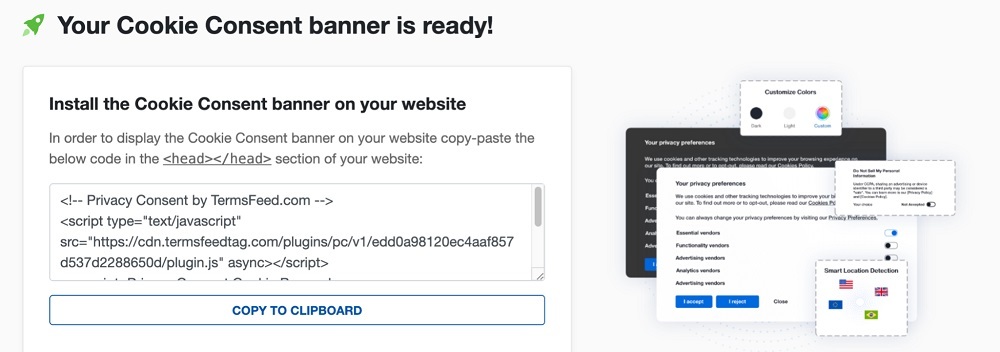
Display the Cookie Consent banner on your website by copy-paste the installation code in the
<head></head>section of your website. Instructions how to add in the code for specific platforms (WordPress, Shopify, Wix and more) are available on the Install page.
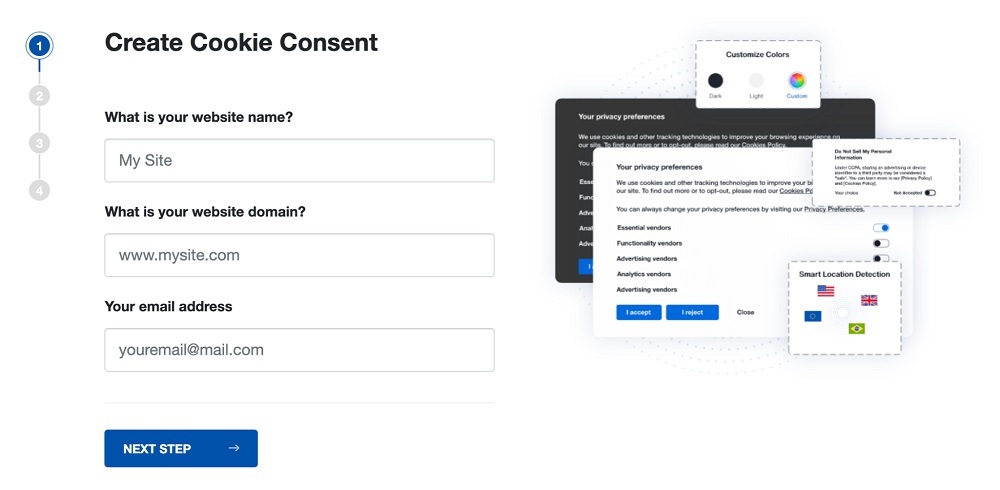
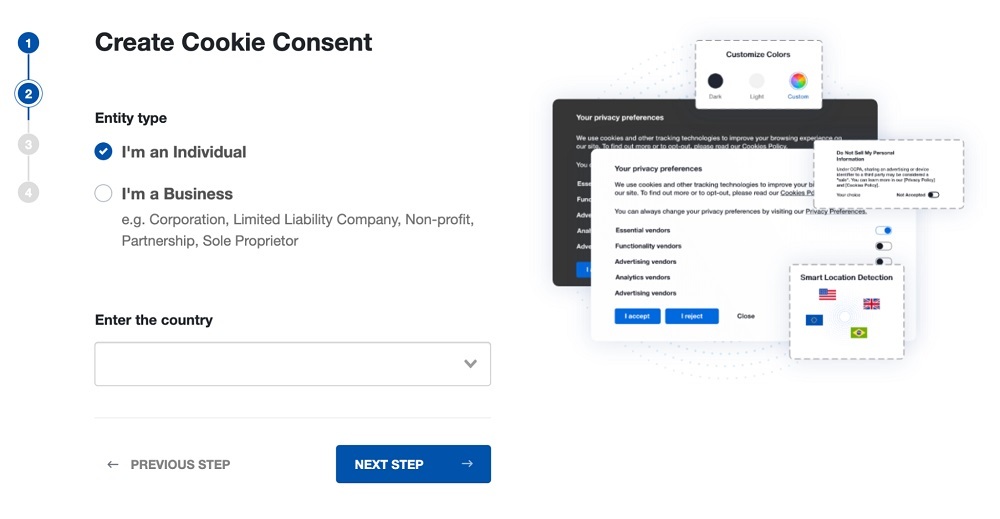
A Return and Refund Policy is an important legal document that outlines how customers can return products and/or receive a refund.
There are specific Return and Refund Policy requirements that businesses with Google Merchant Center accounts need to meet in order to maintain their accounts. Failure to follow these requirements can result in the suspension of your merchant account.
In this article you will learn about what Google Merchant Center and state and international laws require for your business's Return and Refund Policy, what happens if you don't meet those requirements, and how to create a compliant Return and Refund Policy.
An "I Agree" checkbox is a way for websites, apps and other platforms to get users to agree to something by clicking a checkbox.
The checkbox will be next to a statement such as "By clicking "I Agree," you are agreeing to (whatever is being agreed to)."
An "I Agree" checkbox is commonly used to get users to agree to things such as:
- A Privacy Policy
- A Terms and Conditions Agreement
- Receiving marketing communications
- Having cookies placed on a device
You do not have to have an "I Agree" checkbox. However, if you are required to get legal consent for something and don't use a checkbox, you will need to make sure you use a suitable, equally-effective alternative method.
An "I Agree" checkbox is highly recommended for legal compliance because it is easy to implement, easy for users to interact with, and very clearly communicates that consent is being requested.
An "I Agree" checkbox is not a specific legal requirement. However, it will help you prove that you have obtained agreement and consent from your users, which can have strong legal implications.
For example, if you don't use an "I Agree" checkbox to get users to agree to your Terms and Conditions, a disgruntled user can claim they never agreed and thus aren't bound by your Terms. This can have detrimental consequences for your website or service.
Even if not legally required, having an "I Agree" checkbox is highly recommended and a global best practice.
You can use an "I Agree" checkbox any time you wish to obtain consent or agreement from your users. They can be used on websites, apps and other platforms.
Here are some common uses of an "I Agree" checkbox:
- To get agreement to your Privacy Policy and Terms and Conditions
- To get consent to send marketing emails and other communications
- To get consent to place cookies on user devices
Yes. An "I Agree" checkbox will almost certainly be held as legally binding if ever disputed in a court of law.
For something to be legally binding, it must be shown that both parties were aware of the agreement, and adequately consented/agreed. When a user clicks an "I Agree" checkbox, this is a strong, overt act showing consent/agreement.
Note that if an agreement itself is found to be illegal or unconscionable, the agreement may be void even though the "I Agree" checkbox was used.
It's easy to add an "I Agree" checkbox to your website with a generator, such as ours.
All you'll have to do is access TermsFeed's "I Agree Checkbox" tool, customize the fields of what you're requesting agreement to, enter what text you'd like to have appear near your checkbox and select your color palette to have your custom "I Agree" checkbox code generated.
Add the code to your website backend to have it displayed and implemented on your website.
In effect, yes. While they may be displayed differently, a consent checkbox and an "I Agree" checkbox are essentially the same thing.
An "I Agree" checkbox is a type of consent checkbox.
Consent checkboxes don't need to explicitly say "I Agree." They just need to be clear that checking the box is giving consent. For example, a consent checkbox can say "Yes" or "OK" instead of "I Agree" and still be effective at obtaining consent.
- 1. What is Google Merchant Center?
- 2. What are Google's Requirements for Merchant Accounts' Return and Refund Policies?
- 2.1. Tell Customers How to Obtain a Return or Refund
- 2.2. Meet Google's Return and Refund Timeframe Requirements
- 2.3. Inform Customers About Return Window, Customer Return Fees, and Seasonal Overrides
- 2.4. Return Addresses, Return Rules, and Processing Returns
- 2.4.1. Return Addresses
- 2.4.2. Return Rules
- 2.4.3. Processing Returns
- 3. State and Global Legal Requirements for Return and Refund Policies
- 3.1. State Laws
- 3.2. Global Laws
- 4. Why It's Important to Write Your Return and Refund Policy the Correct Way
- 5. How to Create a Compliant Return and Refund Policy for Google Merchant Center
- 5.1. Google Merchant Center Requirements
- 5.1.1. Returning a Product
- 5.1.2. Refund Processing Timeline
- 5.1.3. Return Policy Minimum
- 5.1.4. Return Windows
- 5.1.5. Customer Return Fees
- 5.1.6. Seasonal Overrides
- 5.2. State and Global Requirements
- 5.3. Conditions of Return (Optional)
- 6. What Happens if Your Return and Refund Policy Isn't Compliant with Google Merchant Center?
- 7. Summary
What is Google Merchant Center?
Google Merchant Center is an online dashboard that supports multiple ecommerce platforms, making it easy for your business to advertise its products to millions of consumers around the world.
It allows businesses to upload and promote their product information by creating marketing campaigns via their linked Google Ads accounts, which then show their products to users of various Google services such as Google Search, Google Images, Google Maps, and Google Shopping.
When consumers search for an item via Google Shopping, they receive a list of ads from a number of businesses with Google Merchant Center accounts:
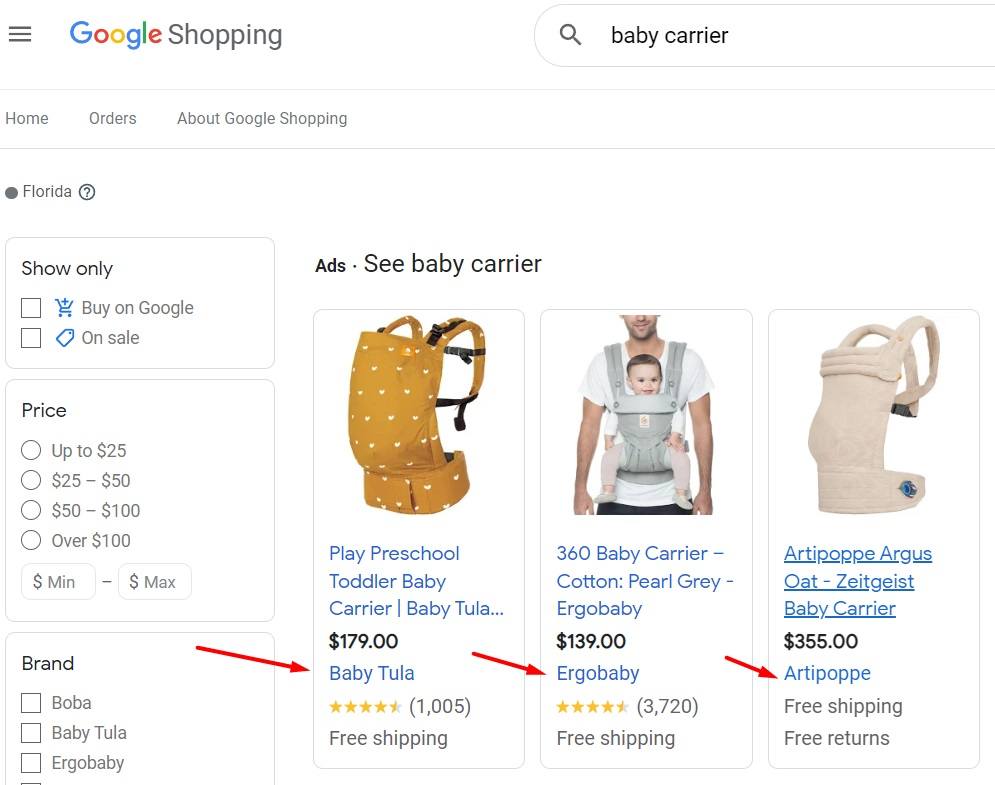
Let's look at what Google requires if you want to have a Google Merchant account.
What are Google's Requirements for Merchant Accounts' Return and Refund Policies?

Google requires that any business with a Google Merchant account maintain a Return and Refund Policy that explains what customers must do in order to be eligible for a return and/or refund, and how your business manages returns and refunds.
Tell Customers How to Obtain a Return or Refund
Your Google Merchant Account Return and Refund Policy should include information about:
- What steps a customer needs to take in order to return a product and/or receive a refund
- What specific circumstances are required for a product to be eligible for returns or for customers to receive a refund
- How long after making a purchase a customer can return a product
- When a customer can expect to receive a refund for their purchase
Google's Merchant Center guidelines include links that describe what methods you can use to share your Return and Refund Policy as well as what information it should contain:
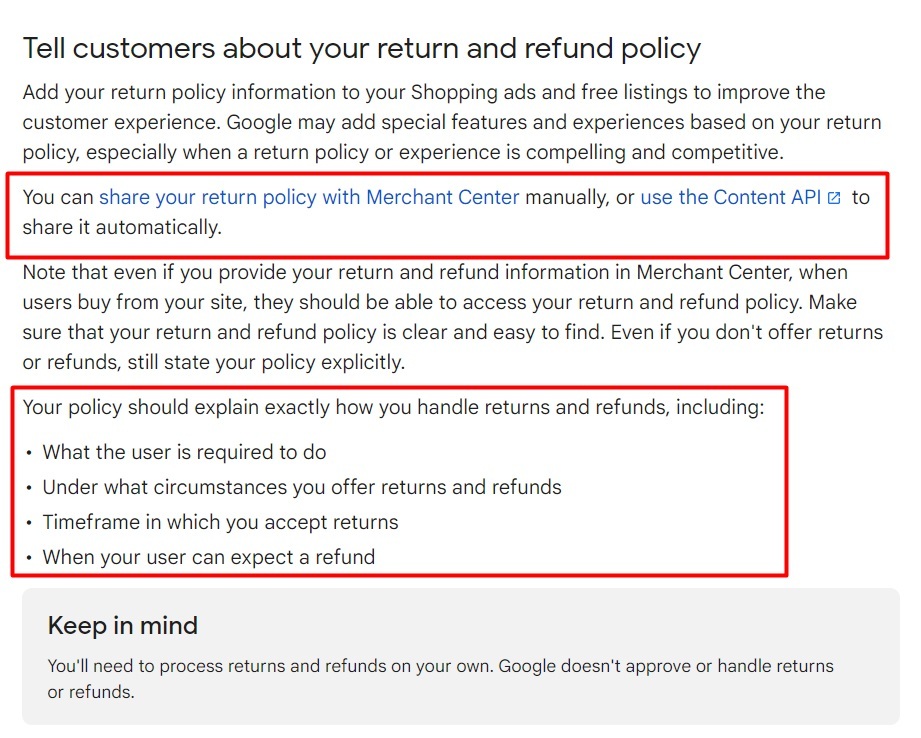
Meet Google's Return and Refund Timeframe Requirements
In order to sell their products directly on Google, businesses based in the U.S can use the Buy on Google service. To use Buy on Google, businesses must fulfill its requirements, including accepting returns for at least 30 days after the date the purchase is delivered and processing refunds within 2 days:
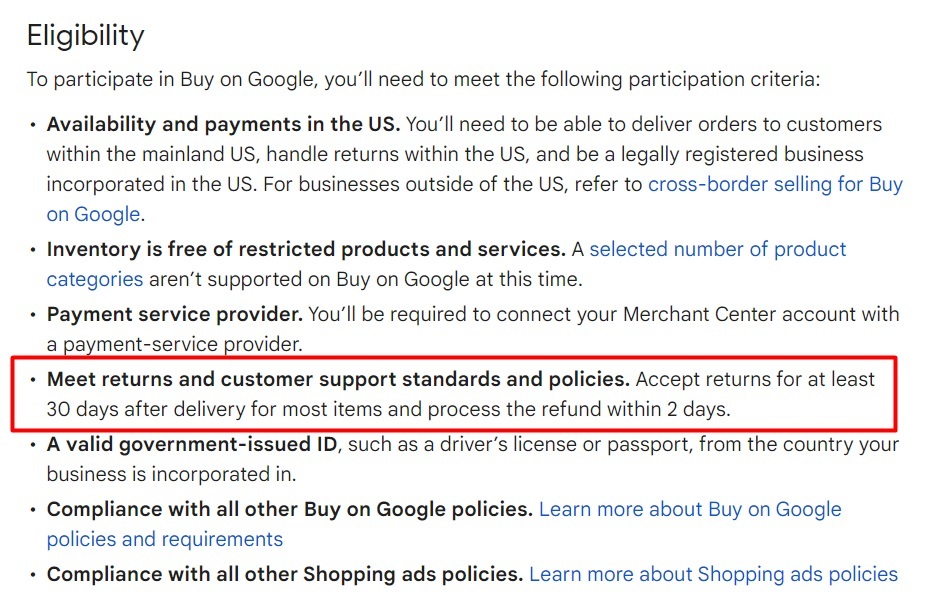
Inform Customers About Return Window, Customer Return Fees, and Seasonal Overrides
Buy on Google's Return Policy requirements include informing consumers about their return window, any customer return fees, and seasonal overrides:

Return Addresses, Return Rules, and Processing Returns
Each product should have a valid return address and pertinent return rules. You will also need to make sure you begin the return process within two business days of receiving a customer's return request.
Return Addresses
You must provide users with at least one return address for all of your products listed on Buy on Google. The return address must be a US return address and it must be the default address listed in your UPS or FedEx carrier account:

The Mountain sells merchandise via Buy on Google, and includes a U.S. shipping address on its website:

Return Rules
Some products may be eligible for a "returnless refund" or may need special processing. Google requires that you add return rules to those products. Products that are eligible for a returnless refund still need to have a valid return address linked to them, and you must describe why your product needs special processing when setting up its return rule:
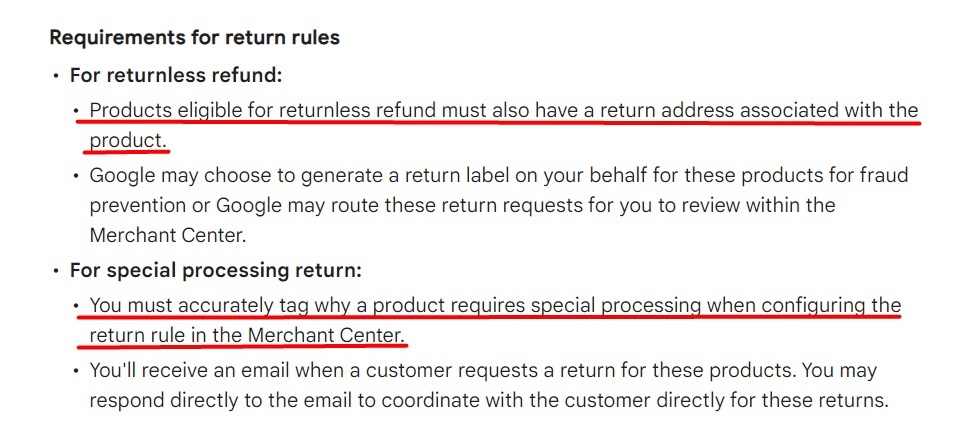
Processing Returns
Google requires that you respond to your customers' return requests within two business days by either providing a return label, carrier name, and tracking number or providing a refund for any products that are eligible for returnless refunds, and that you explain the reason for the return, refund, or refund request rejections.
Failure to process returns within two business days can result in automatic refunds or lowering of your Retailer Standards score:
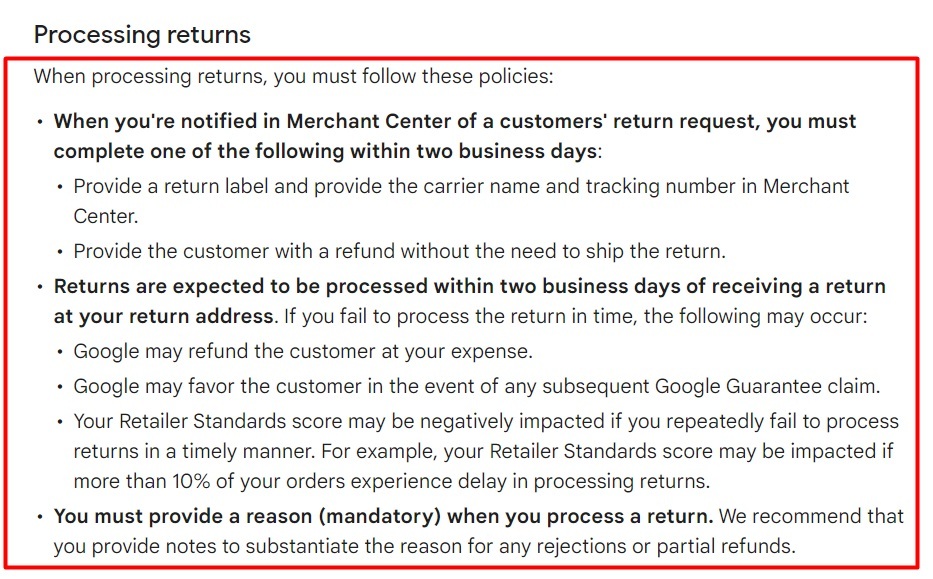
You must also agree to:
- Let Google create return labels for your customers
- Respond to customers' messages within two business days
- Refrain from shipping pre-paid labels along with your products
- Create shipping dimensions for all of your products
- Only use customers' email addresses for scheduling logistics
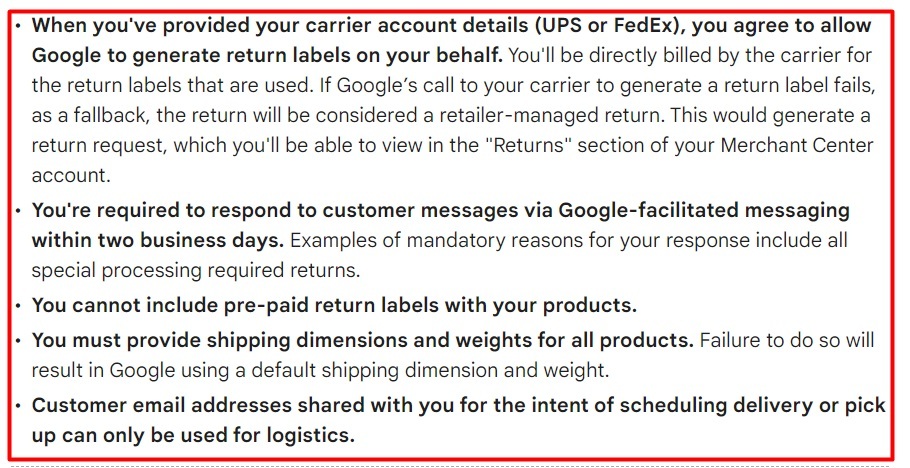
As you can see, Google requires some pretty specific things for your return and refund process and policy. However, that isn't all. Next we'll look at some legal requirements in this area.
State and Global Legal Requirements for Return and Refund Policies

When creating your Return and Refund Policy, you should keep state and global legal requirements in mind.
State Laws
While there are currently no federal requirements for Return and Refund Policies in the United States, there are many state laws that you should be aware of when shipping to customers who reside in those areas.
California is at the forefront of privacy legislation in the United States, and has one of the strongest state laws pertaining to Return and Refund Policies.
California Civil Code Section 1723 states that any business that doesn't offer a full refund or credit for the value of the product, or allow customers to exchange one item for another, must clearly display their Return Policy within their brick and mortar business or on their online order forms.
If your Return Policy is not clearly displayed, then your business may be legally required to refund the amount of the purchase for up to 30 days after the date of the purchase:
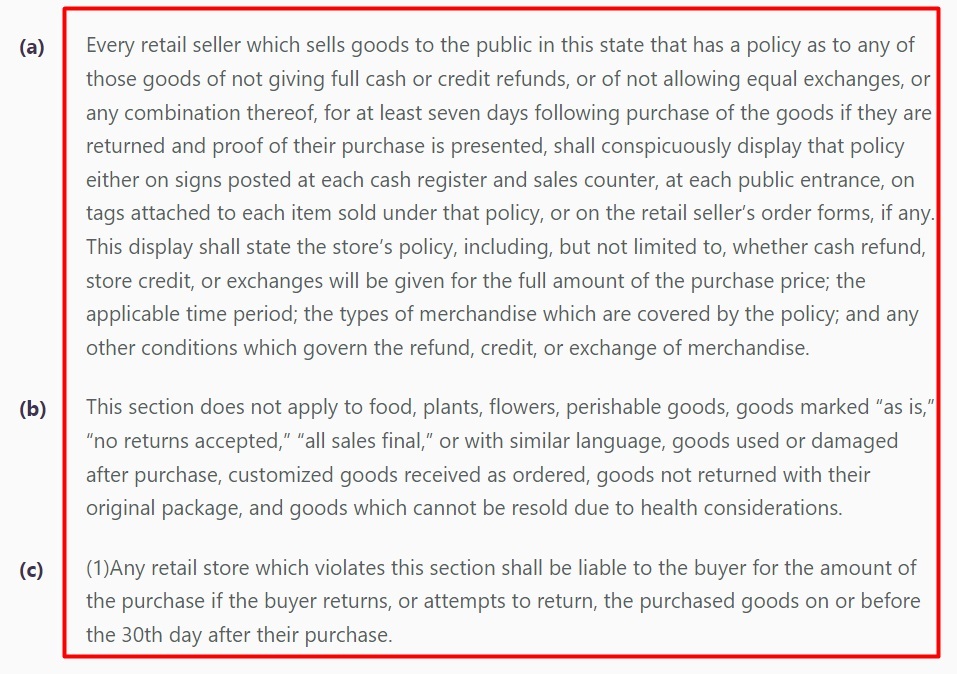
There are currently 13 states with Return and Refund Policy requirements, and it is important to be aware of those requirements if your business is based in any of these states or if you ship to any of those states.
Global Laws
You need to pay attention to global Return Policy laws if your business ships products to customers from other countries.
Europe's Consumer Rights Directive requires that businesses provide a full refund for any purchase that is canceled within two weeks.
Article 9 of Europe's Directive 2011/83 informs consumers that they have the right to cancel any purchase made online for any reason within 14 days:

Burberry's Returns and Cancellations policy lets customers know that they can return items within 14-30 days of shipping, in accordance with Directive 2011/83:
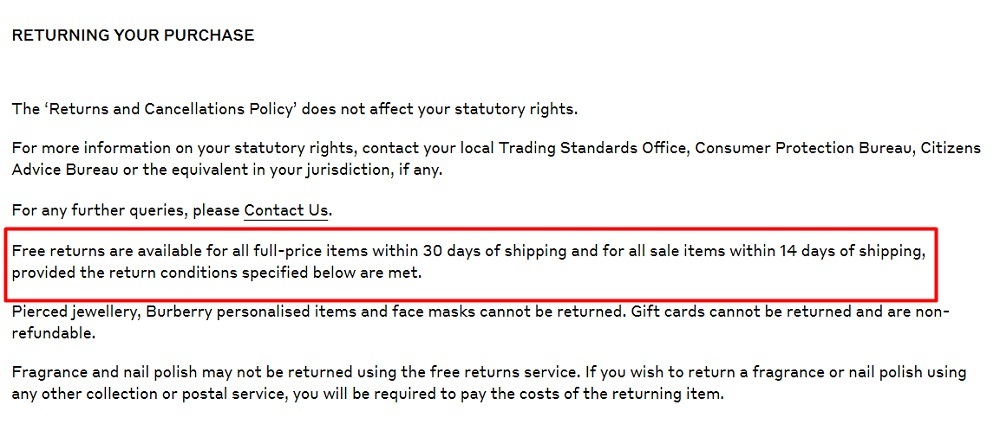
Europe's Sale of Goods Directive requires businesses to refund or replace any faulty goods at no cost to the consumer, while Directive 1999-44 requires that all products come with a two-year guarantee, and that consumers have between 2 and 6 months to inform you about any faulty items they have purchased from you.
Article 14 of Europe's Directive 2019/771 outlines how businesses should handle repairing or replacing defective products:
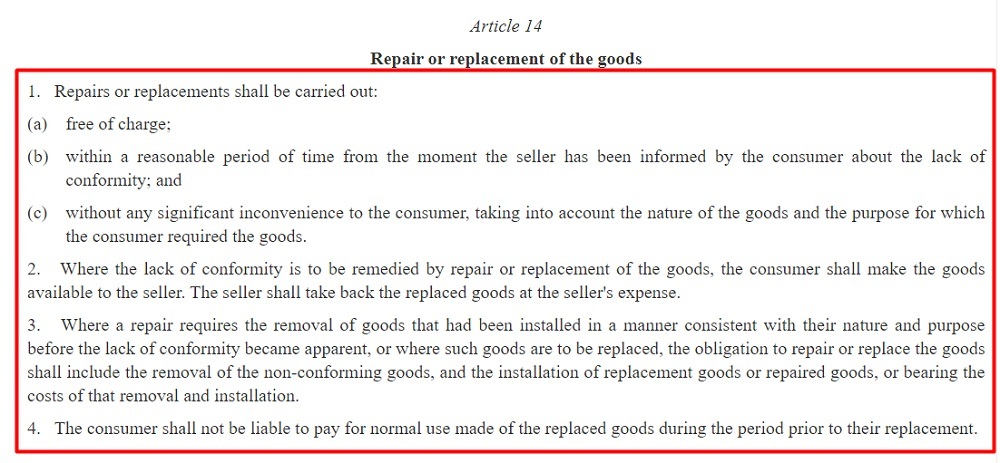
Section 17 of Directive 1999/44 gives consumers the right to return products within two years of purchase, while Section 19 informs consumers that they have a minimum of two months to inform your business about any faulty goods:
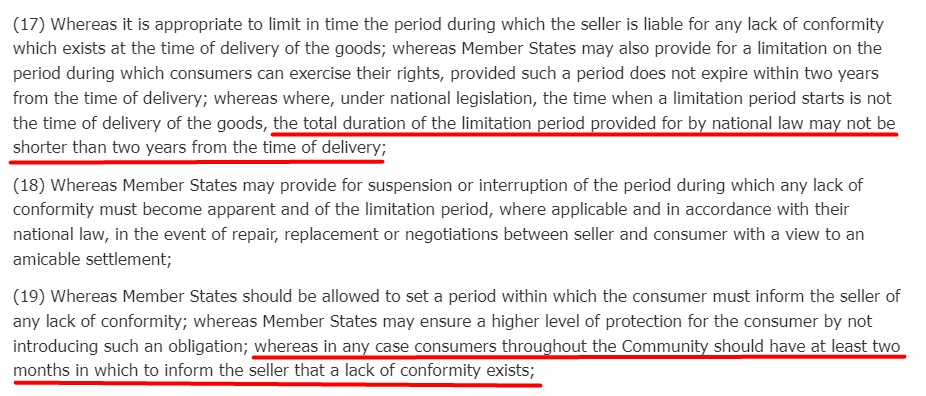
Nike's Return Policy includes a section describing how to return a defective product, based on how much time has passed since the date of the purchase:
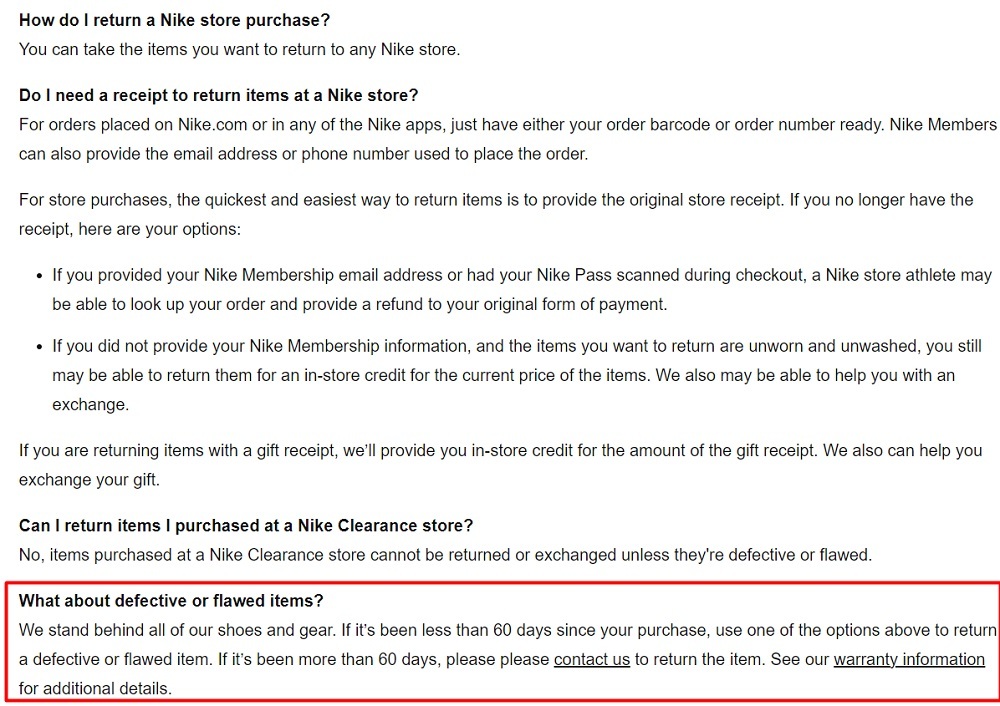
Australia and the UK have similar Return and Refund Policy laws, so if you're shipping to other countries you'll need to make sure you abide by their regulations.
Why It's Important to Write Your Return and Refund Policy the Correct Way

Writing your Return and Refund Policy the correct way helps you to protect your Google Merchant Account and avoid unnecessary charges, and functions as an effective marketing tactic.
- Google can suspend your merchant account if you don't write your Return and Refund Policy correctly, resulting in the loss of exposure, revenue, and brand trust.
- Ensuring that your Return and Refund Policy complies with state and global Return Policy laws can help you to avoid having to pay for certain refunds.
- Many consumers make purchasing decisions based on a business's Return and Refund Policy. If you don't have an accessible Return and Refund Policy, or if it is written in a vague or unclear manner, you risk losing out on potential sales.
How to Create a Compliant Return and Refund Policy for Google Merchant Center

You can make sure that your Return and Refund Policy is compliant by following Google Merchant Center and state and global Return Policy requirements.
Google Merchant Center Requirements
Your Google Merchant Center compliant Return and Refund Policy should tell customers how they can return a product and/or receive a refund and when they can expect a refund. It should contain information about return windows, customer return fees, and seasonal overrides.
You will need to maintain at least one Return Policy for all of your products.
Returning a Product
Outline what the options are for returning items.
Barnes and Noble's Refund and Return Policies gives customers two options for returning items:
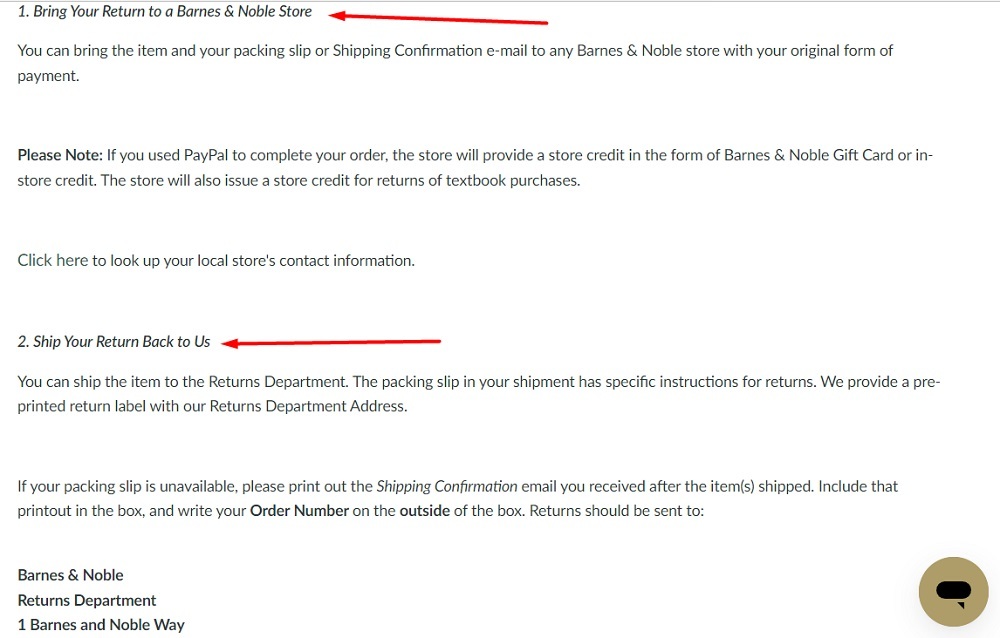
Refund Processing Timeline
You will need to begin the refund process within two business days, and should let customers know when they can expect to receive their refunds.
The Refund timelines section of Google Play's Refund Policies explains the timeframe in which customers can expect to receive refunds:
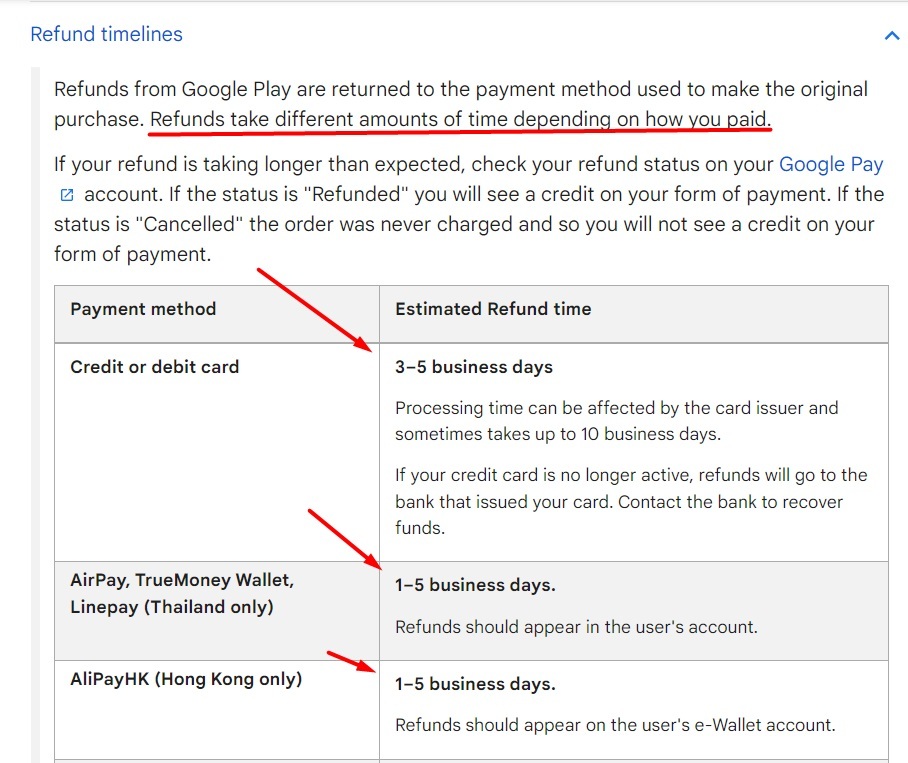
Return Policy Minimum
You will need to have at least one Return Policy for all the products you list on Buy on Google:

Return Windows
The return window is the amount of time between the date (or estimated delivery date) when your product is delivered to a customer and when that product becomes ineligible for return.
Google requires that businesses allow customers to make returns for at least 30 days from the date of delivery, except for products in the "allowable exception categories."
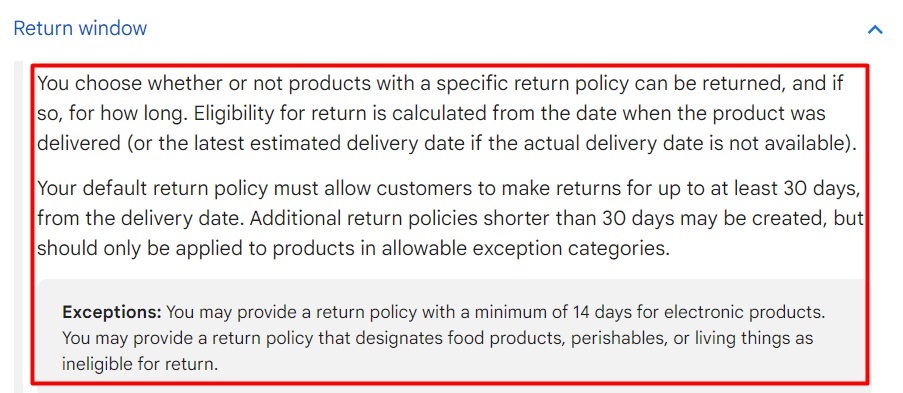
The Cancellations and Refunds section of Garage Department's Shipping and Return Policy lets consumers know that they can return most items within 30 days of purchase, as long as the items have not been opened or used:

Customer Return Fees
When you participate in Buy on Google, your business is charged a customer return fee unless a customer selects any of the "customer remorse" reasons for making the return.
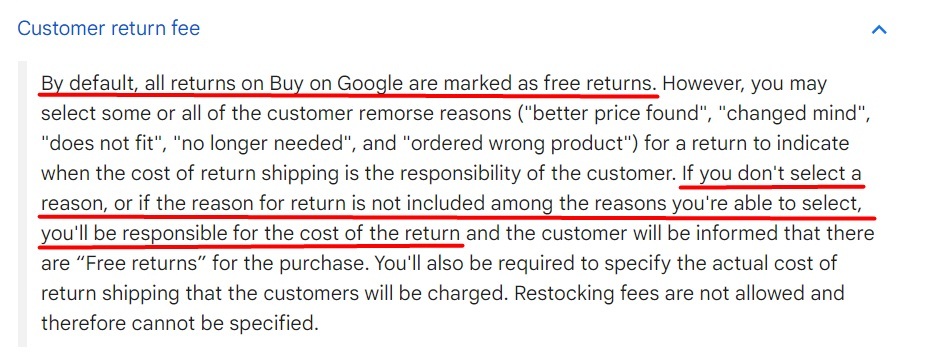
Updater gives a clear explanation about how it provides refunds for customers who find a better price, informing them how to request a refund and when it will be in contact after a request has been made, and including a refund request link:
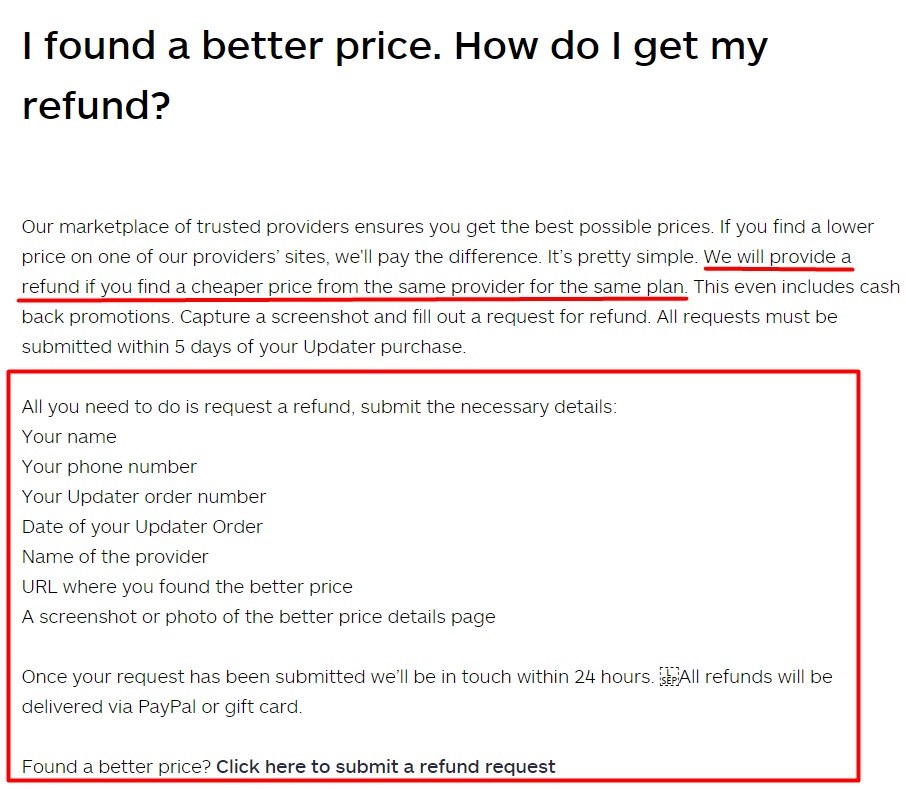
Seasonal Overrides
Google allows businesses to make exceptions to their Return Policies during busy seasons, as long as they still comply with all of its Return Policy requirements.
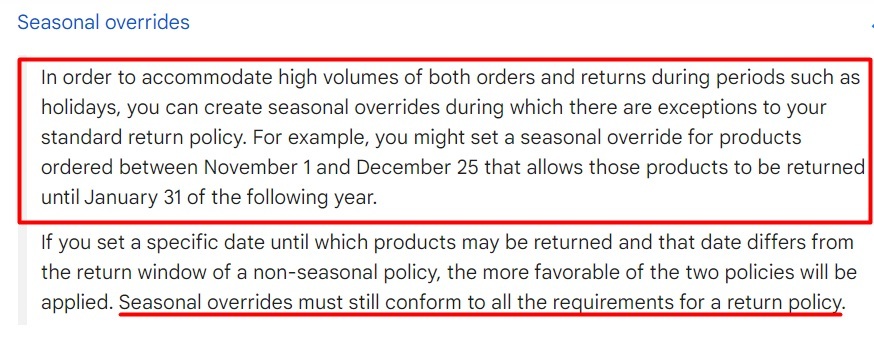
Organic Basics' Return Policy informs customers that its normal return timeline is extended by 30 days during November and December:
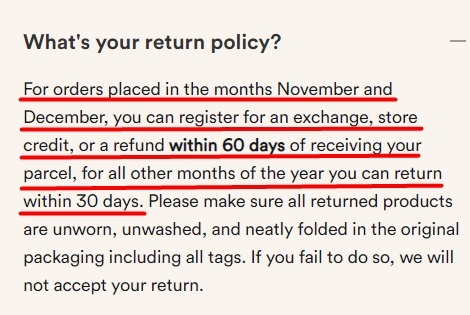
State and Global Requirements
In order to keep your Return and Refund Policy compliant with state and global legal requirements, you should:
- Clearly display your Return Policy on your website and online order forms
- Give consumers 14 days to cancel or return an order made online for a full refund
- Offer a solution (or multiple solutions) for how you deal with faulty goods
- Offer a two-year guarantee
- Provide customers with accurate contact information and respond to their questions or concerns in a timely manner
Conditions of Return (Optional)
In order to protect your business from fraud or scams, your Return and Refund Policy can include conditions, such as requiring a receipt or that items be unused in order to be eligible for a return or refund.
Zymox's Satisfaction Guarantee Guidelines requires that customers provide proof of purchase in order to receive a refund, and informs customers that the refund amount does not include tax or shipping fees:
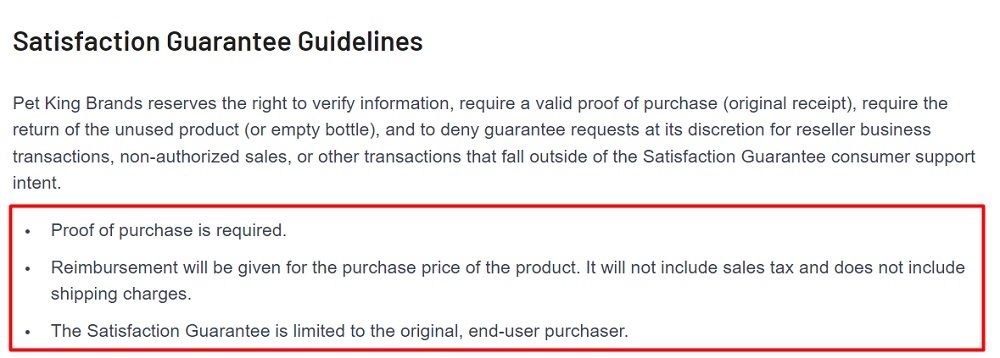
Some businesses require that purchases must be in their original packaging or that items must not have been worn or used yet in order to be eligible for return.
Xero Shoes' Return and Exchange Policy lets customers know that any products that are used outdoors cannot be returned or exchanged:
xero-shoes-return-exchange-policy
Xero Shoes Return and Exchange Policy
[instructions go here]
[instructions go here]
What Happens if Your Return and Refund Policy Isn't Compliant with Google Merchant Center?
If your Return and Refund Policy isn't compliant with Google's requirements, your Retailer Standards score can go down, you may have to pay the full refund amount of the purchased product, and you run the risk of losing your Google Merchant Account.
When you're a Google Merchant, you have access to a Retailer Standards dashboard where you can monitor your "scorecard" from Google. You'll also get an email on the first day of every month showing what your current score is.
Your score is calculated based on the following four criteria, with retailers granted top status having the rate of each criteria noted:
- Item defect rate: Less than 1%
- Shipping defects: Less than 2%
- Delivery defects: Less than 4%
- Return defects: Less than 10%
You can see the other score tiers here, from Google:

The return defect rate is calculated by looking at how many times you have issues with the following:
- Late return processing: You must process returns within 2 business days from when you receive the returned items.
- Tracking numbers that are missing, incorrect, used already, or duplicated will affect your defect rate.
So, if you don't have your Return and Refund Policy set to process returns within 2 business days and you don't follow this policy, your score will drop.
Summary
Google Merchant Center is a tool that businesses can use to sell their products online. Google requires that businesses with Google Merchant Accounts follow its Return and Refund Policy requirements.
Writing your Return and Refund Policy the correct way is important because it helps to protect your Google Merchant Account, keeps you compliant with local and international Return and Refund Policy laws, and helps to support your overall marketing strategy.
A compliant Return and Refund Policy should be created for all products and should:
- Describe the steps consumers need to take in order to return a product and/or obtain a refund
- Allow online consumers to receive a full refund if requested within two weeks of delivery
- Contain information about the process for returning, repairing, or replacing defective products
- Provide a two-year guarantee
- Give customers an easily accessible means of contacting you
- Be posted as a part of your online order forms
If you fail to maintain a compliant Return and Refund Policy, you can be held responsible for the full cost of any requested refunds and your Google Merchant account may be shut down.

Comprehensive compliance starts with a Privacy Policy.
Comply with the law with our agreements, policies, and consent banners. Everything is included.
